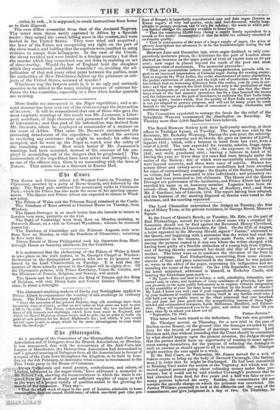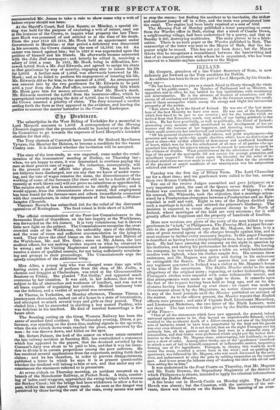Zbe Metropolis.
At a meeting of the Committee of the Metropolitan Anti-Corn-law Association and of Delegates from the Branch Associations, on Monday, it was announced, that with the concurrence of the Anti-Corn-law League at Manchester, the Metropolitan Association had determined to call a general meeting of Delegates from all the Associations in favour of a repeal of the Corn-laws throughout the kingdom, to be held in Lon- don on the 8th February, to determine what course to recommend to the Free Trade party in the House of Commons.
...ertivers >qiitplesale and retail grocers, confectioners, and others, of London, interested in the sugar-trade," have addressed a memorial to Sir Robert Peel, showing the inconveniences to which the trade is ex- posed from the want of steady and sufficient supplies of sugar, as well as the want of a proper variety of qualities suited to the growing de- mands of the consumer. They say- " That the whole stock of sugar in the port of London, admissible to home consumption, does not exceed 19,000 tons; of which one-third part (the pro- duce of Bengal) is imperfectly manufactured cane and date sugar (known as Khaur sugar), of very bad quality, rank, and foul-flavoured, wholly inap. plicable to grocery purposes, and fit only for refining; the waste in which pro- cess further abridges the quantity available to home uses. " That the remaining 13,000 tons (being a supply barely equivalent to a mouth or five weeks' consumption) is also far below the ordinary standard of serviceable quality. " That in consequence of the want of a larger supply of sugar, the price of grocery descriptions has advanced 5s. to 8s. the hundredweight during the last three months."
Between June and December last, when sugar declined to only com- paratively moderate prices, the deliveries for the port of London alone showed an increase on the same period of 1840 of 14,000 tons or 30 per cent ; now sugar is placed beyond the reach of the poor and most numerous class of customers. The memorial proceeds- " That your memorialists believe much misapprehension prevails with re- gard to an increased importation of Colonial auger during the ensuing season; that as respects the West Indies, the entire abandonment of many plantations, the partial cultivation of others, and the high cost of production, make it but too evident that an increasing deficiency from this source, year by year, is cer- tain ; and that as respects the East Indies, not only is the production of that country inadequate as yet to meet such a deficiency, but also that the disas- trous result of the last season's operations has for a time lessened the means and the inducement on the part of merchants to cultivate the East India trade with any spirit ; besides which, that the quality of East India sugar generally is not yet adapted to grocery purposes, and will not for many years to come furnish to the larger and poorer class of consumers a cheap, wholesome, and nutritious sugar."
The Committee appointed to manage the funds for the relief of the Spitalfields Weavers commenced the distribution on Saturday. By Tuesday more than 2,000 families had been relieved.
The Royal Humane Society held their half-yearly meeting, at their offices in Trafalgar Square, on Tuesday. The report was read by the Secretary, Mr. Berkeley Westropp. During the past year, the subscrip- tions, donations, sermons, and dividends, &c. gave an income of 2,2664, legacies 1381. ; which, with a balance in hand from last year, form a total of 2,5691. The sum expended for rewards, salaries, drags, appa- ratus, honorary medals, &c. was 1,479/. ; the expenses in Hyde Park 5841., and stock purchased 498/. ; leaving a balance in hand of 61. During the year, no fewer than 214 cases had been brought under the notice of the Society; 200 of which were successfully treated, eleven were beyond recovery, and three were cases of suicide. Sixteen ho- norary silver and twenty-seven bronze medallions had been awarded for cases of extraordinary courage ; the thanks of the Society, inscribed on vellum, had been presented to nine individuals ; and pecnniary re- wards had been presented to 106 claimants. The Queen and the Queen Dowager are patronesses of the institution, and Prince Albert has lately enrolled his name as an honorary member. Legacies have been re- ceived—from Mrs. Penelope Smith, late of Banbury, 6001. ; and from Mr. J. Gardiner, late of Lincoln, 100/. The report having been adopted, and the business of the meeting disposed of, thanks were voted to the chairman, and the meeting separated.
The Lord Chancellor entertained the Judges on Tuesday, the first day of Hilary Term, at his private residence, in George Street, Hanover Square.
In the Court of Queen's Bench, on Tuesday, Mr. Erle, on the part of Earl Fitzhardinge, moved for a rule to show cause why a criminal in- formation should not be filed against the Reverend Henry Cleveland, Rector of Barkstone, in Lincolnshire, for libel. On the 27th of August, a letter appeared in the Morning Herald, signed " Junius," addressed to the Queen, and beginning with a statement that the writer had read the announcement in the Gazette, of newly-made Peers, with pain ; as among the persons named in it was one whom the writer charged with having been guilty of a forcible abduction of a young lady from Clifton, and of having thereby occasioned her death and that of her widowed mother. The letter went on to condemn the elevation of the Peer in strong language. Earl Fitzhardinge, conceiving, from some circum- stances of time and place mentioned in the letter, that he was pointed at, wrote to the editor of the paper, expressing his indignation and de- manding the name of the writer. On the 10th September, he received the letter subjoined, addressed to himself, at Berkeley Castle, and bearing the Grantham post-mark-
" My Lord—Born and bred in infamy, a cold, calculating. debauchee, con- sistent only in crime, and destitute of every semblance of principle, how dare you presume so far upon public forbearance as to express virtuous indignation at the possibility of your fair fame being tarnished by the breath of slander ? My Lord, I know you well; and if your unparalleled effrontery, unrestrained by your modicum of worldly wisdom, betray itself in any farther overt acts, I will hold you up to public scorn as the vilest miscreant that ever breathed. Go and pour out your griefs into the sympathizing bosoms of those high- minded and calumniated compeers, Lords Melbourne, Headford, and Palmer- ston. They will recommend you to be quiet, and rather bear those ills you have, than fly to others you know not of. " September, 7th 1841. Primo-Rams."
This letter bad been traced to the defendant. The rule was granted.
Mr. Thesiger moved, on Thursday, for a new trial in the case of Darbon versus Rosser, on the ground that the damages awarded by the Jury for the breach of promise of marriage were excessive. Lord Denman said, that without intending that the Court should be committed by what should happen upon the present occasion, the Judges thought that the parties should have an opportunity of coming to some agree- ment among themselves, for the purpose of reducing the damages to such an amount as should appear to all to be reasonable. Mr. Thesiger might mention the case again in a week. In the Bail Court, on Wednesday, Mr. James moved for a writ of habeas corpus to bring up the body of Bernard Cavanagh, (the fasting- man,) in order that he might be discharged. He had been committed to Reading Gaol under the section of the Vagrancy Act which was di- rected against persons going about collecting money under false pre- tences; but it could not be said whether Cavanagh's pretence that he had abstained from food for five years and a half was false or not— many persons believed his story. Besides, the commitment did not contain the specific charge on which the prisoner was convicted. Mr. Justice Williams promised to look at the affidavits and the copy of the commitment, and give judgment in a day or two. On Thursday, he recommended Mr. James to take a rale to show cause why a writ of habeas corpus should not issue.
At the Sheriff's Court, Red Lion Square, on Monday, a special sit- ting was held for the purpose of executing a writ of extent, sued out at the instance of the Crown, to inquire what property the late Theo- dore Hook was possessed of and entitled to at the time of his death. From the year 1813 till 1818, Mr. Hook held an appointment under Government in Mauritius : at that period a deficiency was discovered in his accounts, the Crown claiming the sum of 12,5851. 14s. 6d. An extent was issued against him; but in 1825 it was superseded upon the petition of himself and his friends. He afterwards became connected with the John Bull newspaper ; and latterly he edited it, receiving a salary of 500/. a year. In 1831, Mr. Hook, being in difficulties, bor- rowed 3,0001. from a Mr. Joel Edwards, and agreed to assign his share to that gentleman by way of security, engaging also to insure his life for 2,0001. A further sum of 1,0001. was afterwards borrowed by Mr. Hook ; and as he failed to perform his engagement of insuring his life, Mr. Edwards did so for him, to the amount of 4,000/. An arrangement was entered into by the two gentlemen for Mr. Edwards to be paid 400/. a year from the John Bull office, towards liquidating bills which Mr. Hook gave him for money advanced. After Mr. Hook's death, Mr. Edwards received the 4,0001. from the insurance-office, which he appropriated towards paying the debt of 8,000/. due to himself, whereas the Crown asserted a priority of claim. The Jury returned a verdict setting forth the facts as they appeared in the evidence, and leaving the parties to contest the matter hereafter in the Court of Exchequer.



























 Previous page
Previous page